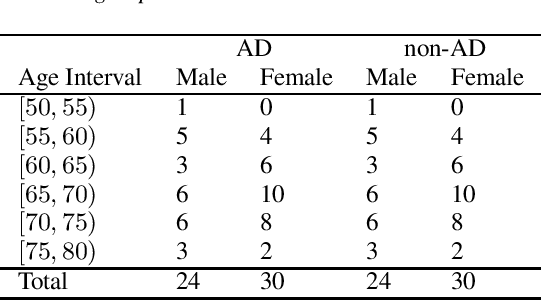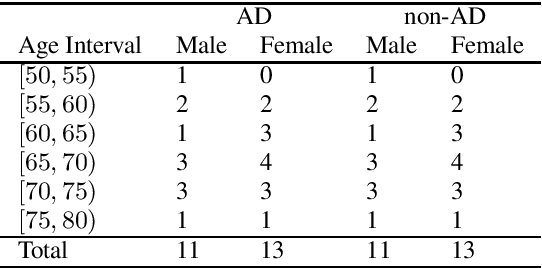Davida Fromm
Connected Speech-Based Cognitive Assessment in Chinese and English
Jun 18, 2024



Abstract:We present a novel benchmark dataset and prediction tasks for investigating approaches to assess cognitive function through analysis of connected speech. The dataset consists of speech samples and clinical information for speakers of Mandarin Chinese and English with different levels of cognitive impairment as well as individuals with normal cognition. These data have been carefully matched by age and sex by propensity score analysis to ensure balance and representativity in model training. The prediction tasks encompass mild cognitive impairment diagnosis and cognitive test score prediction. This framework was designed to encourage the development of approaches to speech-based cognitive assessment which generalise across languages. We illustrate it by presenting baseline prediction models that employ language-agnostic and comparable features for diagnosis and cognitive test score prediction. The models achieved unweighted average recall was 59.2% in diagnosis, and root mean squared error of 2.89 in score prediction.
Multilingual Alzheimer's Dementia Recognition through Spontaneous Speech: a Signal Processing Grand Challenge
Jan 13, 2023Abstract:This Signal Processing Grand Challenge (SPGC) targets a difficult automatic prediction problem of societal and medical relevance, namely, the detection of Alzheimer's Dementia (AD). Participants were invited to employ signal processing and machine learning methods to create predictive models based on spontaneous speech data. The Challenge has been designed to assess the extent to which predictive models built based on speech in one language (English) generalise to another language (Greek). To the best of our knowledge no work has investigated acoustic features of the speech signal in multilingual AD detection. Our baseline system used conventional machine learning algorithms with Active Data Representation of acoustic features, achieving accuracy of 73.91% on AD detection, and 4.95 root mean squared error on cognitive score prediction.
Detecting cognitive decline using speech only: The ADReSSo Challenge
Mar 23, 2021Abstract:Building on the success of the ADReSS Challenge at Interspeech 2020, which attracted the participation of 34 teams from across the world, the ADReSSo Challenge targets three difficult automatic prediction problems of societal and medical relevance, namely: detection of Alzheimer's Dementia, inference of cognitive testing scores, and prediction of cognitive decline. This paper presents these prediction tasks in detail, describes the datasets used, and reports the results of the baseline classification and regression models we developed for each task. A combination of acoustic and linguistic features extracted directly from audio recordings, without human intervention, yielded a baseline accuracy of 78.87% for the AD classification task, an MMSE prediction root mean squared (RMSE) error of 5.28, and 68.75% accuracy for the cognitive decline prediction task.
Alzheimer's Dementia Recognition through Spontaneous Speech: The ADReSS Challenge
Apr 30, 2020



Abstract:The ADReSS Challenge at INTERSPEECH 2020 defines a shared task through which different approaches to the automated recognition of Alzheimer's dementia based on spontaneous speech can be compared. ADReSS provides researchers with a benchmark speech dataset which has been acoustically pre-processed and balanced in terms of age and gender, defining two cognitive assessment tasks, namely: the Alzheimer's speech classification task and the neuropsychological score regression task. In the Alzheimer's speech classification task, ADReSS challenge participants create models for classifying speech as dementia or healthy control speech. In the the neuropsychological score regression task, participants create models to predict mini-mental state examination scores. This paper describes the ADReSS Challenge in detail and presents a baseline for both tasks, including a feature extraction procedure and results for a classification and a regression model. ADReSS aims to provide the speech and language Alzheimer's research community with a platform for comprehensive methodological comparisons. This will contribute to addressing the lack of standardisation that currently affects the field and shed light on avenues for future research and clinical applicability.
 Add to Chrome
Add to Chrome Add to Firefox
Add to Firefox Add to Edge
Add to Edge